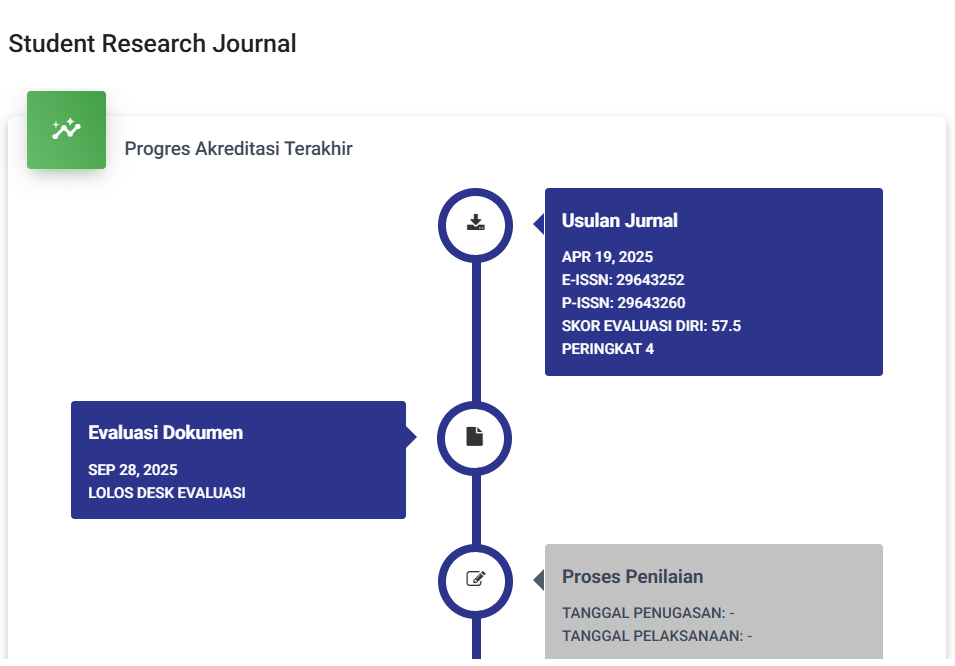Kuliner sebagai Warisan Budaya : Eksplorasi Sate Kuok dan Makan Bedulang di Desa Pulau Belimbing
DOI:
https://doi.org/10.55606/srj-yappi.v2i6.1628Keywords:
Culture, Culinary, Kampar, Eat Badulang, Sate KuokAbstract
Indonesia has ethnoculinary diversity, one example of which is satay kuok and makan bedulang with the main side dishes being grilled fish kopiek dak betulang. This research aims to explore the role of traditional culinary delights, especially Sate Kuok and Makan Bedulang with the main side dish of grilled fish kopiek dak betulang, in strengthening the cultural identity of the Kampar community. Using participatory observation methods, this research analyzes the social and cultural values contained in these two dishes. The research results show that Sate Kuok not only functions as food, but also as a symbol of togetherness and social interaction in society. Order codes used in buying and selling transactions reflect local wisdom and strengthen relationships between community members. This research emphasizes the importance of preserving traditional culinary delights as part of cultural identity in the modern era. It is hoped that the results of this research can provide new insights into the relationship between culinary and cultural identity as well as contribute to the preservation of local cultural heritage.
References
Aini, A. N., Ahmad, D. A., Puspa, E., Putri, M., Muthmainnah, F. H., & Hurumatillah, Z. H. (2024). Peran kuliner tradisional Nusantara dalam mempengaruhi kegiatan ekonomi dan bahasa di Indonesia. Jurnal Pendidikan Tambusai, 8(2), 22243–22252.
Amalia, S., Jumadi, & Dewi, D. W. C. (2023). Argopuro: Jurnal Multidisiplin Ilmu Bahasa. Argopuro: Jurnal Multidisiplin Ilmu Bahasa, 1(4), 1–14. https://ejournal.warunayama.org/index.php/argopuro/article/view/1107
Ambarwati, A., Hidayah, L., Murniatie, I. U., Ahmadi, A., & Funada, K. (2023). Exploring memory, spice aromas, and Indonesian heritage food in Leila S. Chudori’s “Pulang” novel. [Judul Konferensi], [Lokasi Konferensi], [Tanggal Konferensi]. In [Nama Buku Prosiding] (pp. [Halaman]). [Penerbit]. https://doi.org/10.2991/978-2-38476-144-9_4
Andriyanti, A., & Setiawan, B. (2024). Upaya pelestarian dan pengembangan kue tradisional Betawi. (1), 1–14.
Chan, T. H., Faizah, H., Elmustian, & Syafrial. (2024). Kajian ekolinguistik : Makanan tradisional sate kuok sebagai daya tarik wisata kuliner di Kabupaten Kampar. INNOVATIVE: Journal Of Social Science Research, 4(1), 2358–2365.
Hariadi, J. (2018). Pembelajaran bahasa Indonesia berbasis kearifan lokal. Jurnal Samudra Bahasa, 1(1).
Harsana, M., & Triwidayati, M. (2020). Potensi makanan tradisional sebagai daya tarik wisata kuliner di D.I. Yogyakarta. Universitas Negeri Yogyakarta, 15(1), 1–24. https://journal.uny.ac.id/index.php/ptbb/article/view/36472
Hendro, eko punto. (2020). Simbol: Arti, fungsi, dan implikasi metodologisnya. Jurnal Ilmiah Kajian Antropologi, 3(2), 158–165. https://ejournal.undip.ac.id/index.php/endogami/article/download/30640/17351
Isti’anah, A., Angin, D. M. P., & Praptomo, B. I. (2023). Ekolinguistik. Sanata Dharma University Press.
Oktamia, A. P. (2022). Jurnal Pendidikan dan Konseling. 4(20), 1349–1358.
Sina, A. (2023). “Rires” Kajian Etnokuliner Etnis Karo di Desa Biru-biru Kecamatan Biru-biru Kabupaten Deli Serdang. JUPSI: Jurnal Pendidikan Sosial Indonesia, 1(2), 47–56. https://doi.org/10.62238/jupsijurnalpendidikansosialindonesia.v1i2.47
Tarigan, K. E., Simamora, R. M., Angin, S. P., Katolik, U., & Thomas, S. (2024). Cultural identity and language use : a study of Karo ethnic students at University of Saint Thomas Medan. (4307), 885–893.
Wijaya, S., Morrison, A., Nguyen, T.-H., & King, B. (2016). Exploration of culinary tourism in Indonesia: What do the international visitors expect? In Proceedings of the Asia Tourism Forum. 2016 - the 12th Biennial Conference of Hospitality and Tourism Industry in Asia (pp. [Halaman]). Paris, France: Atlantis Press. https://doi.org/10.2991/atf-16.2016.56.
Downloads
Published
How to Cite
Issue
Section
License
Copyright (c) 2024 Hany Eliza, Elmustian Elmustian, Fatihah Fauziah, Ananda Nurrizka Efendi, Zaskia Putri Rhamadani Candra, Nirzara Utari, Salsabila Ahadani, Rahma Andini Gunawan

This work is licensed under a Creative Commons Attribution-ShareAlike 4.0 International License.








